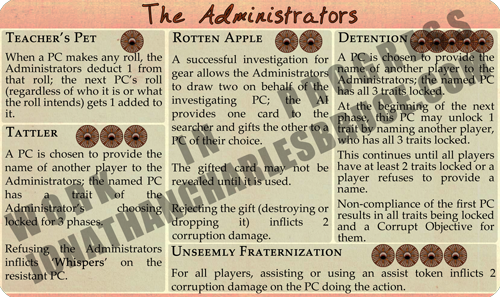Otherworld: Infinite Requiem
Aberrant Intelligences
Hello, everyone! It has been a while for a number of reasons, many of which rhyme with “the smorld is on smire”. But I have returned to tell you that there is an exciting new development in Otherworld: Infinite Requiem, if you’re definition of “exciting” is unveiling a new way to play the game. So here’s hoping!
Aberrant Intelligence
Do… do you get it? Because… ‘cause it can be abbreviated as AI?
Like… artificial intelligence? For a computer?
The way that I had initially designed the game (and can still be played) was by having players take turns as the ‘Aberrant Player’, where they would handle monster movement and spawning. This individual would also be responsible for reading any events that would occur throughout that particular turn (unless of course, they triggered an event, which allows them to choose one of the other players to read).
My intent was to have this diffuse responsibility throughout the entire team; namely, no one person would end up shouldering the blame for a particularly nasty roll, unfortunate baddie placement, or an event that ended up making an objective impossible to complete. It would also serve to emphasize the lack of a concrete, single antagonist as the main oppositional force, but subtly prod the players to view themselves as the enemy.
During one of the earliest playtests, my friend Heidi suggested that it may help the entire turn-by-turn process by getting a player whose dedicated job was to move and spawn all the aberrations on the board. They’d be responsible for anything else monster-related, which would free up the human players’ ability to concentrate on their tasks at hand. While it did seem like it had the potential to help speed up the turns, my concern fell on the fact that this tasked a player with process without input. That is to say, it made them commit to functions (movement, attacks, rote reading) without contributing anything of their own.
Over the last several months, I had a lot of down time between major playtests. Between when it was first suggested and the last playthrough, a lot of the procedural hiccups had been addressed, but still I found myself ruminating on Heidi’s idea. After what I feel was far too much time for something that feels incredibly obvious to me now, I hit upon the central aspect that would make it fun: “Why not give that hypothetical player powers to mess with everyone else?”
I went to the drawing board (which, in this case, is a Word document) and started sketching out (which, in this case, refers to writing semi-coherent things) details for four different personas that the new class of player—the Aberrant Intelligences—could adopt. Each one would have a different skill set that emphasized a unique danger of the Infinite Requiem experience. After some back and forth balancing out powers in terms of impact and cost, the four AIs emerged.
The Administrators are Displeased
At the beginning of the project, I created a couple of keyword clusters to help define what it is that these various Aberrant Intelligences would personify and represent as a game-world threat. Very early on in the process, ‘distrust’ and ‘discipline’ were clustered together. From there, I drew upon the antagonists from one of my all-time favorite games to lend this power set its name.

The Administrators’ powers revolve around getting the players to undermine each other in some way. As the game progresses, an Aberrant Intelligence will gain a number of tokens to spend on powers. The more powerful and disruptive the impact, the greater the cost. As you can see with the Administrators, the lesser levels are a bit subtler with how they sow resentment. At the three and higher levels, though, players will be required to call out their teammates in an effort to save their hides from pretty nasty effects. To the Administrators, these trite squabbles will be object lessons in humanity’s unreliability.

The currency that the AI uses to activate their powers are referred to as ‘Malevolent Influence’ tokens. While every AI will gain one token every turn, certain actions (players or otherwise) will generate a new one. For the Administrators, the first failed search of a turn will provide them with a token. The Administrators, in some ways, feed on the frustration of despair of those that they view as their indolent students, hence the strengthening of their influence.
While each AI loses their five unique powers at the start of a Team Event, they are granted a new set of powers that are themselves exclusive to each type of event. For instance, all AIs may directly control a boss monster, determining where and how they move; this has the potential to create a cat-and-mouse game or surgical strikes against weak team members or those separated from the pack.
But that’s not all! Each AI has an advanced power for one of the four Team Events available. The Administrators, for instance, create an avatar that they control during an event where players must investigate a number of areas on the map. This avatar moves at the AI’s discretion and may actively investigate for the players’ objectives, keeping victory in the hands of a dangerous unit until they are dispatched.
So there we have it! Over the next month or so I’ll be getting the next batch of cards and whatnot for more beta testing. All four AIs will be included in the next round, so here’s hoping that they don’t break the game! And who knows; maybe if they’re really successful, a couple more will end up joining the fray.
Until next time!
< PREVIOUS ENTRY • NEXT ENTRY >
Advice • Fiction • Gaming • General Musings • Reviews





